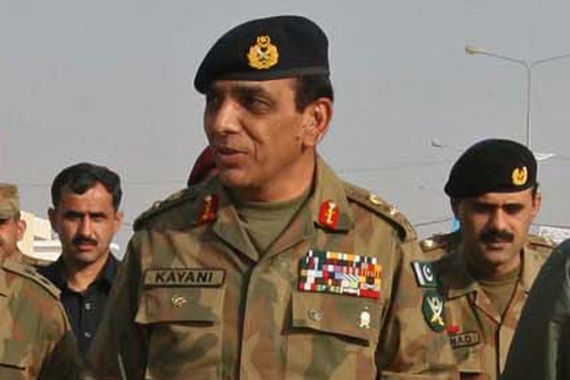Pakistan army chief calls ‘special meeting’
Kayani to meet army commanders as ties with US hit new low following claims spy agency is backing Haqqani group.

Pakistan’s army chief has called for a “special” meeting of fellow senior commanders following US allegations that the military’s spy agency helped fighters attack American targets in Afghanistan.
Ashfaq Kayani issued the call on Sunday after senior Pakistani officials strenuously denied the allegations of support for the Haqqani network, accusing the US of trying to make Pakistan a scapegoat for its troubled war in Afghanistan.
The escalated war of words has further undermined a rocky alliance between the two countries.
Mike Mullen, the chief US military officer, accused Pakistan’s Inter-Services Intelligence agency on Thursday of supporting Haqqani fighters in planning and carrying out a 22-hour assault on the US Embassy in Afghanistan on September 13 and a truck bomb that wounded 77 American soldiers days earlier.
Kayani, widely considered the most powerful man in Pakistan, has dismissed the allegations, saying the charges were baseless and part of a “blame game” detrimental to peace in Afghanistan.
In the latest development, James Mattis, the commander of US central command, arrived in Islamabad on Sunday to hold discussions with Kayani about the current challenges in the US-Pakistan relationship.
Mattis emphasised the vital role the Pakistani military plays in international security efforts and the need for more co-operation among the two country’s militaries.
Yousuf Raza Gilani, Pakistan’s prime minister, also strongly denied the accusations in a statement issued late on Saturday.
“We strongly reject assertions of complicity with the Haqqanis or of proxy war,” Gilani said in a statement.
“The allegations betray a confusion and policy disarray within the US establishment on the way
forward in Afghanistan.”
Pakistan links suspected
Pakistan claimed to have severed its ties with Afghan fighters after the September 11, 2001, attacks on US soil and supported the US war in Afghanistan.
But US officials have long suspected it maintained links with the fighters and Mullen’s recent comments were the most serious accusations.
Leon Panetta, US defence secretary, has implied that US forces could even carry out unilateral raids inside Pakistan against the Haqqani network, operations that could have grave implications in a country where anti-American sentiment is widespread.
Hina Rabbani Khar, Pakistan’s foreign minister, warned the US government on Saturday against sending troops into Pakistan, saying there are red lines and rules of engagement that should not be broken.
“It opens all kinds of doors and all kinds of options,” she told Pakistan’s Aaj News TV in response to a question about the possibility of more US troops coming to Pakistan.
Despite the US statements, which appear to accuse Pakistan of state-sponsored terrorism, Mullen, like other US officials, has said Washington needs to maintain relations with Islamabad.
The US knows that it will probably need the Pakistani government’s co-operation in bringing Afghan fighters to the negotiating table.
Gilani also called for closer ties with the US.
“Let’s avoid mutual recrimination and recommit ourselves to working together for eliminating terrorism and for reconciliation and peace in Afghanistan,” he said.